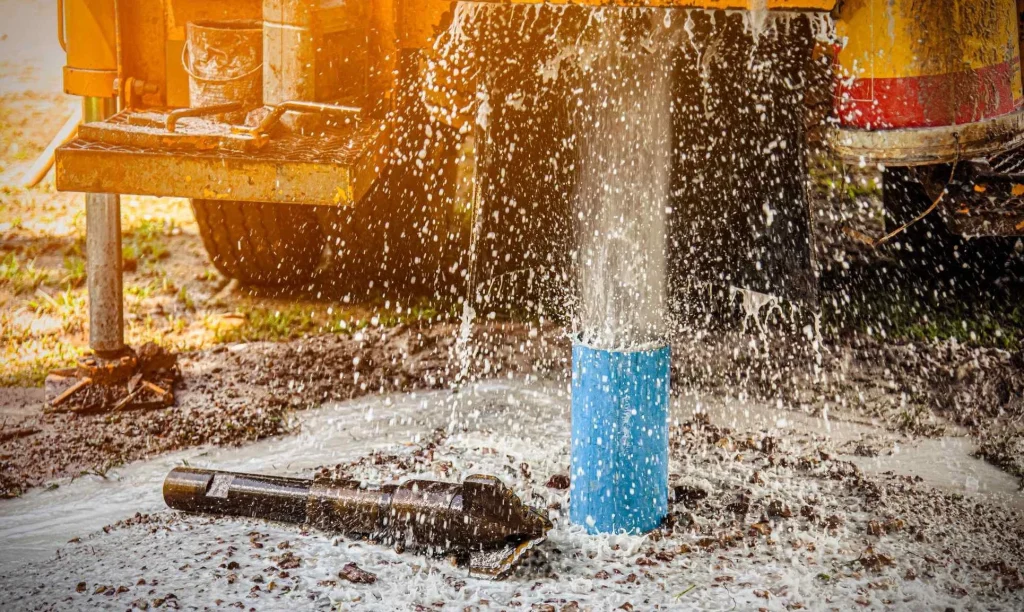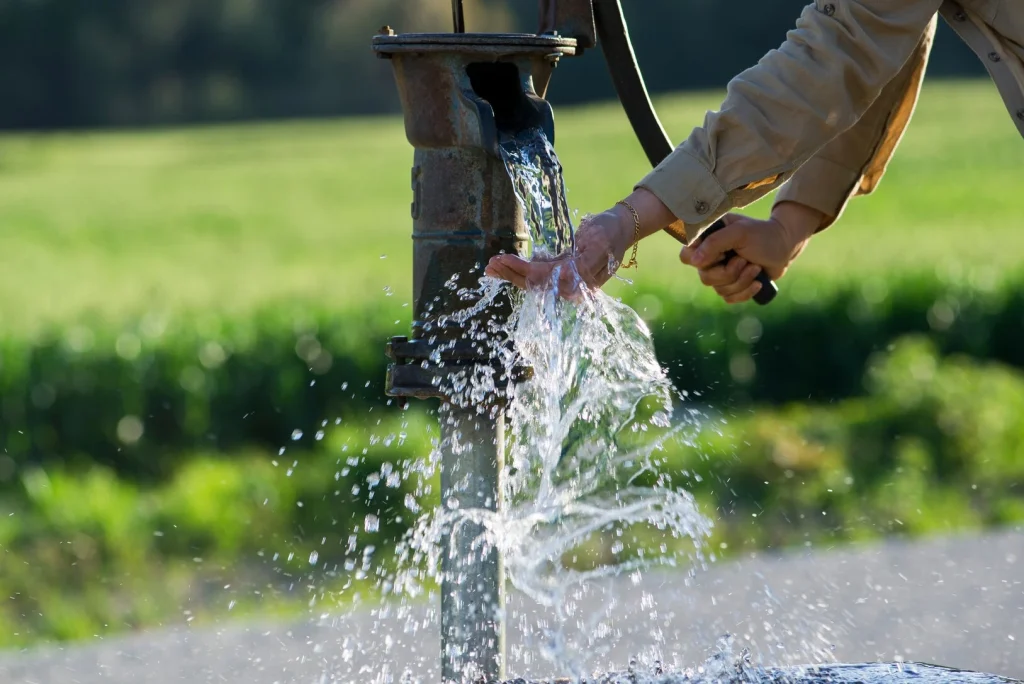In the history of borewell drilling in India, it has been a pivotal role in addressing the country’s water scarcity. Water access is crucial for agriculture, domestic use, and industrial activities. Throughout borewell drilling history of India, communities have faced water scarcity, emphasising the need for sustainable solutions. Sustainable practices ensure consistent water access for community well-being and growth in essential sectors. The story of borewell services in India is a testament to the importance of bringing water resources closer to their most critical needs.
Ancient Techniques and Wells
In the borewell drilling history of India where water harvesting methods were crucial for sustaining communities. These techniques included innovative methods for capturing and storing rainwater, showcasing the resourcefulness of ancient civilizations. In ancient techniques borewell drilling India, traditional wells were crafted with a deep understanding of local geography and water harvesting methods in India and showcasing a harmonious blend of human ingenuity and environmental adaptability.
Medieval Innovations
During medieval times, India’s borewell drilling revolutionised water management and access. Persian and Islamic engineering influenced drilling techniques, while Mughal and Rajput eras improved water supply systems. This period in the history of borewell drilling in India saw the evolution of traditional well drilling in India for showcasing the rich legacy of technological progress and cross-cultural influences.
Colonial Influence and Modernization
In the colonial period of British ruling, the borewell drilling in India underwent significant transformation. British policies focused on water resource exploration and management, leading to the introduction of modern drilling techniques. This era in borewell drilling history in India saw the emergence of hand-operated and mechanised equipment to enhance efficiency and address water demand in agriculture and daily life. This highlights the importance of technological advancements and policy initiatives in shaping water management practices.
Post-Independence Era

The water management policies have significantly changed in this post-independence era. The government implemented policies to address water scarcity and promote sustainable practices. Traditional well drilling in India was encouraged for agricultural and domestic use. Technological advancements in drilling equipment and ancient techniques borewell drilling in India streamlined the process, making it more efficient and accessible. This period in the history of borewell drilling in India represents a transition from ancient practices of borewell drilling in India.
Environmental and Social Impacts
The history of borewell drilling in India has led to significant environmental and social impacts. The over exploitation of groundwater levels and aquifers has raised concerns about depleting water resources and potential long term ecosystem effects. Social and economic implications are significant, affecting both rural and urban communities. Borewells provide essential water sources, but their indiscriminate use leads to disparities in access, disproportionately affecting marginalised communities. Balancing the benefits of borewell drilling with environmental and social consequences remains a critical consideration in India’s history.
Kerala scenario
The borewell drilling history in India the state kerala has faced a lot of challenges in water supply. The terrain area and unstable climatic conditions made the water supply crucial. Traditional open wells have been replaced by borewells, but concerns about groundwater depletion and environmental impact have been raised. This borewell drilling history in Kerala reflects the intersection of technological evolution, environmental challenges, and the adaptation of water sourcing. The history of borewell drilling in Kerala is marked by specific challenges and innovations, reflecting the region’s unique geological and cultural aspects.
A Comprehensive Journey through the History of Borewell Drilling in Kerala
In the thorough Exploration of Kerala’s History of Borewell Drilling Kerala, this state is the region of rich cultural diversity, breathtaking scenery, and an abundance of water resources, lies tucked away on India’s southwest coast. The state experienced problems with water scarcity despite its natural resources because of population growth and rising agricultural demands. As a game-changing solution, borewell drilling has dramatically changed Kerala’s water environment over time.
The Early Years
The mid-20th century saw a population explosion and an intensification of agricultural methods in Kerala, which is when the state’s history of borewell drilling began. Due to the depletion of conventional water sources like ponds and wells, researchers had to look for other ways to access groundwater.
The Advent of Borewell Technology
A major change occurred in Kerala during the 1960s when borewell drilling technology was introduced. In the beginning, simple instruments were used for laborious drilling in order to reach the water table.
Technology Evolution
Deeper and more effective borewell installations were made possible by the paradigm change brought about by the replacement of manual methods with motorised drilling equipment. The widespread use of hydraulic rigs and rotary drilling greatly raised the success rate of striking water reservoirs.
Agricultural Revolution
The Green Revolution that swept through Kerala was made possible in large part by borewell drilling. In order to promote agricultural growth and increase crop yields, farmers accepted this technology and began irrigating their fields. For many farmers, the availability of groundwater through borewells became a lifeline, particularly during times of unpredictable monsoons.
Residential Water Supply
Borewells have become essential for providing homes with the residential water they need, aside from agriculture. Both urban and rural areas witnessed a surge in borewell installations to supplement municipal water supply or as an independent water source.
Challenges and Concerns
The widespread adoption of borewell drilling also brought forth challenges. Over-extraction of groundwater led to issues such as declining water tables and increased salinity in certain regions. As demand continued to rise, sustainable water management practices became imperative.
Government Regulations
Recognizing the importance of regulating borewell drilling, the Kerala government implemented guidelines and licensing procedures. These measures aimed to strike a balance between the necessity for water and the need to protect the state’s groundwater resources.
The Role of Private Borewell Contractors
In the realm of private borewell contractors, Indus Geotech Borewells stands out as a notable player, founded by Geo. Essar Pradeep in 1991. This establishment brought a unique blend of geological expertise and drilling technology, contributing significantly to the efficient exploration of groundwater resources in Kerala.
Future Prospects
Drilling borewells is still a crucial part of Kerala’s water resource management strategy. To ensure that the state has a resilient water future, sustainable practices, technical advances, and community awareness are critical components.
Kerala’s history of digging borewells is indicative of the state’s efforts to address issues related to water scarcity. To ensure water security for future generations. Borewells have had a significant impact on agriculture, towns, and daily life by changing the water landscape from their modest origins to technical developments. It will be crucial to operate borewells responsibly and sustainably, with support from private contractors like Indus Geotech Borewells, as Kerala develops
Challenges and Regulation
The history of borewell drilling in India faces challenges such as over-extraction of groundwater and potential contamination. Current regulations and policies are being debated to promote sustainable practices and prevent adverse environmental and social impacts. There is a growing recognition of the need for more robust regulatory frameworks, considering ancient techniques and traditional well drilling in India. Future measures should balance water needs with environmental protection and reflect India’s evolving history and ancient techniques borewell drilling India.
The history of borewell drilling in India has evolved from traditional techniques to modern innovations, impacting water management and socio-economic aspects. However, challenges such as over-extraction and contamination have emerged, affecting groundwater levels and communities. A call for sustainable practices is made to prioritise water access and environmental conservation. By embracing ancient wisdom, considering existing regulations, and proposing innovative solutions, a balanced and sustainable approach can be achieved in the borewell drilling history of India.

